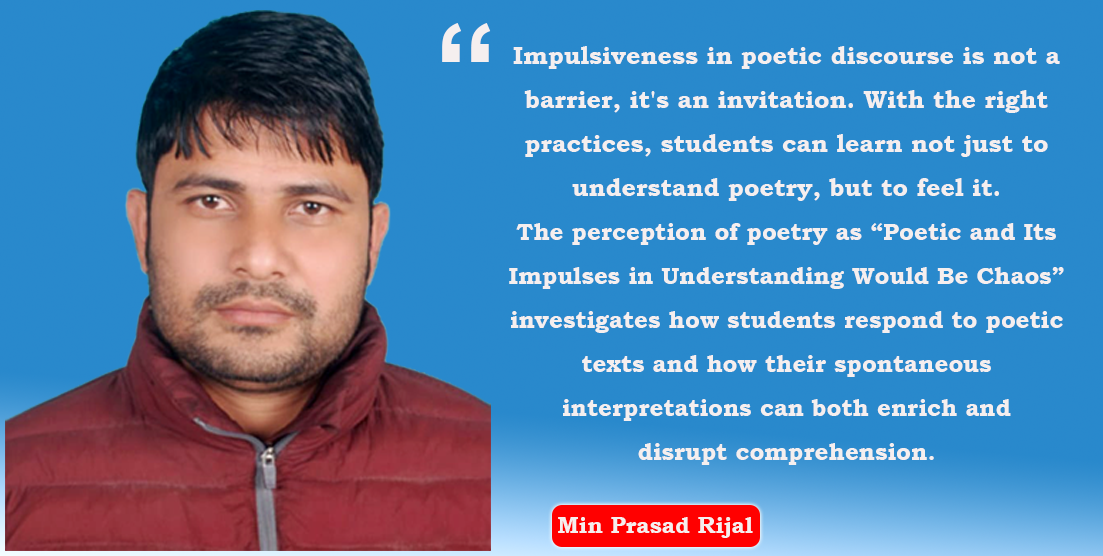Poetry should not be an enigma to solve but a landscape to wander. This sentiment captures the essence of poetic engagement, especially within Nepal’s secondary education system, where students often struggle to grasp the emotional and interpretive depth of poetic texts.
The feeling of emotional overflows like a flood that explodes poetic creation. This impulsiveness is not a flaw but a vital force behind poetic expression. However, when narrowed to the secondary level, poetic impulsiveness reveals both chaos and ambiguity. What appears to be an orderly composition often becomes disordered due to the multiplicity of interpretations it offers.
This ambiguity does not reside solely in the poet’s intention but emerges through the stanza, metaphor, personification, simile, enjambment, meter, and other literary devices. Students, though familiar with prose and basic verse forms, often weaken when confronted with symbolic, ironic, or satirical messages.
These complexities sometimes contradict the straightforward thoughts of authors and writers they are adapted to, making poetry feel chaotic rather than creative.
The poet, in essence, is both an imitator and a creator drawing from reality while reshaping it through imagination. Poetry does not confine itself to a single theme or emotion; its scope expands beyond personal feelings and thoughts. It embraces diverse realms such as romance, tragedy, imaginary, fantasy, realism, platonic, metaphysical; each contributing to the richness of the poetic era.
Unlike other subjects, poetry lacks uniformity and does not present concrete ideas in a straightforward manner. Its fluidity and openness to interpretation make it difficult for students to engage with confidently. For secondary-level students in Nepal, developing a meaningful understanding of poetry presents a significant challenge. Fundamentally, the core concern in both the creation and comprehension of poetry lies in its flow: how thoughts, emotions, and literary devices interlink to convey meaning beyond the literal. Despite these difficulties, poetry is smoothly running in the Grade 11 and 12 classes.
Results found that the difficulties are some of them are way of presentation, focus questions rather than feeling (exam oriented), and missing the forum of literary fair as needed. At the same time, controlling on the given outlines where the feelings and thoughts are confined into limited boundaries further restricts creative engagement. For students unfamiliar with this mode of expression, impulsiveness can feel chaotic rather than creative.
To bridge the gap between poetic intention and student understanding, educators must adopt more dynamic and student-centered strategies. One student interpreted a poem about rain as a political protest. Another saw it as heartbreak. Both were valid but neither aligned with the poet’s intent.
Impulsiveness in poetic discourse is not a barrier, it’s an invitation. With the right practices, students can learn not just to understand poetry, but to feel it. The perception of poetry as “Poetic and Its Impulses in Understanding Would Be Chaos” investigates how students respond to poetic texts and how their spontaneous interpretations can both enrich and disrupt comprehension.
Interaction with students in Nawalparasi revealed two contrary thoughts on the same theme: a minority of students thought poetry is like a mirror, some see themselves, others see shadows. This ambiguity should be brushed away by adopting new ways of teaching that allow all students to express their emotions, feelings, and thoughts, reflecting both in writing and understanding.
In Nepal’s growing education landscape, poetry remains a powerful yet hectic force. When guided thoughtfully, it can transform impulsive reactions into profound understanding. But without that guidance, the classroom risks becoming a frontline of confusion.
The statement ejaculates that impulsiveness in poetic discourse should be reaching out to the students for removing its ambiguity in the poem’s understanding. Came up with the conclusion that poetry’s impulsiveness is not something to subdue, it is something to embrace, nurture, and channel into meaningful literary exploration.
Writer: Min Prasad Rijal
Kumarwarti Multiple Campus





सम्वन्धित समाचार
नागरिक समाजको खबरदारी पत्र : ५ लाख रोजगारी र पर्यावरणीय समाजवादको माग
टर्किस जहाजमा प्राविधिक समस्या, ढाका ‘डाइभर्ट’
कांग्रेसको प्रतिज्ञा पत्र केन्द्रीय समितिबाट सर्वसम्मत पारित
राष्ट्रपतिबाट राष्ट्रियसभाको चालु अधिवेशन अन्त्य
व्यापारीले ग्यास लुकाउन थालेपछि आयल निगम आफैंले बेच्न थाल्यो
राष्ट्रियसभा बैठक बस्दै, प्रधानमन्त्री कार्कीले चलचित्र विधेयक पेस गर्ने